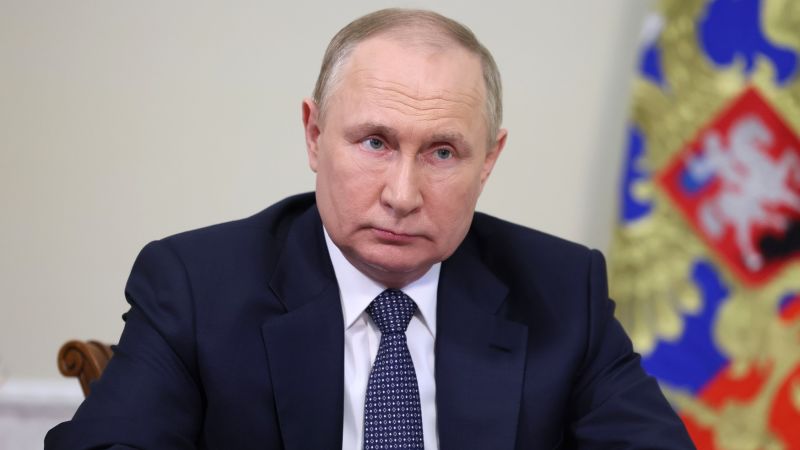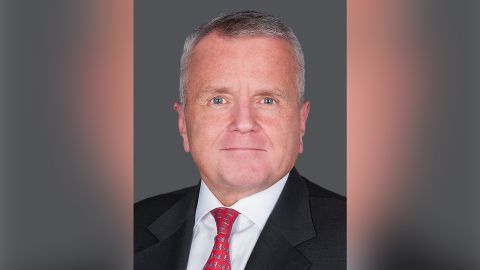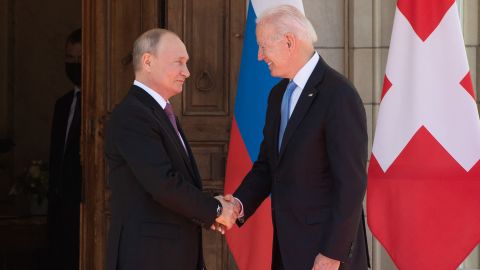
Editor’s Note: John J. Sullivan was US Ambassador to Russia from December 2019 to October 2022. He was previously US Deputy Secretary of State. And is now a partner in Mayer Brown LLP and a Distinguished Fellow at the School of Foreign Service at Georgetown University. The views expressed in this commentary are his own. Read more opinion on CNN.
CNN
—
Almost exactly one year ago, I sat in my office at the US Embassy in Moscow, reading reports of Russia’s brutal military assault on Ukraine. I was numb – but not surprised – by the gravity of what was unfolding.

For weeks, I had been telling everyone I could reach that Russian President Vladimir Putin was going to launch a war on the continent of Europe, the scale of which had not been seen since World War II.
Although confident in my pre-war assessment, I was disconsolate. For two years, I had worked hard as US ambassador to make even modest progress in the few areas in which any dialogue was possible with the Russians.
My approach was reaffirmed following President Joe Biden’s meeting in Geneva with Putin in June 2021. No one in our US delegation at Geneva had any illusion that we would certainly make progress on any particular issue, but all agreed it was in the interests of the United States to try.
Engagement with the Russians following the summit had barely begun when there was a seismic shift. The bloody history of Russia’s seizure of territory from Ukraine in 2014-2015 had cast a pall over our relationship with Moscow but had not broken it.
While relations were dire, we were still looking for ways to stabilize our engagement with the world’s only other nuclear superpower. What US intelligence officials told senior policymakers in late 2021 about Russia’s preparations for an invasion of Ukraine, however, changed everything on which we had been working.

Immediately, our engagement was reduced to the grave Russian threat to Ukraine and the “security guarantees” Russia sought from the United States and NATO. It was apparent to me that the Russians had no intention of negotiating in good faith.
Russian interlocutors read from their talking points and would not engage in a real dialogue. Minders from the Russian security services monitored every meeting and phone call. The Russians were going through a diplomatic charade to lay the groundwork for an invasion that Putin had already decided to launch. The only question was when.
Once it began, Russia’s aggressive war completely upended what little was left of its relationship with the United States – and many other countries. We learned that history had not ended and, indeed, that February 24 changed history. This was not just a brutal war on Ukraine, it was a war on Europe.
The war changed things great and small, from where I lived in Moscow to Russia’s standing in the world. I had to move onto the Embassy compound because the pace of teleconferences with Washington, combined with an eight-hour time difference, meant I had to be immediately available at all hours.
More significantly, the invasion roiled the global economy, including energy and grain markets. And most tragically, it slaughtered thousands of innocents and caused unspeakable suffering for millions of Ukrainians because of a policy choice by Putin in his quest for empire.
To try to defend the indefensible, Putin propagated a false narrative that the invasion was necessary to “de-Nazify” and demilitarize Ukraine. He claimed that Ukraine was engaged in a “genocide” against Russians and Russian-speakers and was on the verge of attacking Russia itself – hence Moscow’s “Special Military Operation.”
This justification for Russia’s aggressive war against Ukraine is absurd on its face and has been rejected by overwhelming majorities in the UN General Assembly and the International Court of Justice.
Yet the merciless Russian violence (which has forced almost 15 million Ukrainians to become refugees or internally displaced), the catastrophic missile strikes on civilian targets and the unlawful occupation of sovereign Ukrainian territory continue. And all by a country, Russia, that is a permanent member of the UN Security Council, whose mission is to preserve and defend world peace.
The war is an existential threat to Ukraine and a grievous security challenge for Europe, the United States and our allies and partners around the world. But it is more than that. Putin’s war threatens to put a stake through the heart of the international system created after World War II, which so far has prevented another world war, and should be opposed by any nation that rejects archaic notions of empire and wars of conquest.
This is a menacing global problem that will only get worse—the economic toll alone is staggering—until it is stopped and reversed on terms acceptable to Ukraine that will protect its sovereignty and security.
That is a tall order as Putin’s Special Military Operation grinds on with a subtext of nuclear blackmail. Putin’s government will not negotiate or compromise on its war aims, which seek the elimination of the government in Kyiv and the subjugation of the Ukrainian people.
The Russians did not negotiate in good faith before the war, and they will not do so now. There is no “off ramp” until Putin achieves his longstanding goals.
I say this with a heavy heart, as a person who was an advocate for continued negotiations with the Russian government even as the downward spiral of our relationship accelerated. I left a comfortable perch on Mahogany Row at the State Department as the Deputy Secretary State to serve as the US ambassador in Moscow and take the lead in those negotiations.
But my view, like the views of so many others, changed when massive swarms of Russian soldiers, tanks, aircraft, and missiles crossed the international border on February 24 to bludgeon Ukraine and its people. Now is not the time for negotiations. On the other hand, President Biden correctly has made clear that the United States does not want a war with Russia.
This raises Lenin’s famous question: what is to be done? I believe the way forward for the United States is, first, to double down on diplomacy to convince those nations that have not joined in stoutly supporting the defense of Ukraine of the moral, political, legal and military necessity of doing so.
Second, to enforce vigorously existing sanctions and export controls to starve the Russian military but not the Russian people.
Third, to provide Ukraine with all the equipment and supplies, military and otherwise, needed to expel the invaders from its sovereign territory.
Fourth, to have patience and the courage of our collective (with allies, partners and others) convictions.
Only then will the Russian government realize that the goals of its Special Military Operation cannot and will not be achieved. Only then will the Russian government negotiate in good faith. And only then will peace return to Europe.
